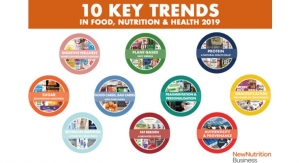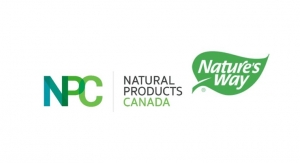By Shelley King, MSc, MBA, CEO, Natural Products Canada12.06.18
The Canadian natural health market has seen some significant moves in recent years. With the legalization of cannabis, globally-recognized regulations and a flurry of multinational investments, things appear to be shifting into high gear.
Canadians buy roughly $1.2 billion of vitamins and supplements each year. For a country of around 37 million, that’s a per capita spend of around $32, which is less than half of what Americans spend. So where’s the opportunity in natural health products (NHPs)?
To start, there’s the quality and quantity of companies developed in Canada. The country’s stellar research institutions and strong support network for entrepreneurs are leading to some highly innovative and technology-driven businesses.
Mazza Innovation, for example, has an advanced botanical water extraction technology that eliminates the need for solvents, meeting the demand for “clean label” dietary supplements. After attracting a strong global customer base, Mazza was acquired by Sensient Technologies in 2018 for $20 million.
Advancing Industry
Another sign that Canada’s environment is ripe for developing and commercializing unique natural health products is a new partnership between Nature’s Way (parent company Schwabe Group), known for its broad array of natural products, and Natural Products Canada, a national organization developed to advance naturally-derived products ranging from NHPs to green chemicals. Together they will identify and invest in promising new companies in the natural health and nutrition segments.
Nestlé, which has been manufacturing in Canada since 1918, is also bullish on Canada. The company recently announced its intention to purchase Atrium, a Canadian NHP company, for $2.3 billion. Other big players include Jamieson, the Canadian vitamin giant founded in 1922, which went public in 2017. Jamieson is thought to take a little over 20% share of the Canadian NHP and vitamin sales, with Wyatt, Valeant, and Shoppers Drug Mart, a Canadian pharmacy chain, holding the next top spots.
Deals like these are catching the eyes of other investors, prompting Canadian editions of industry-specific events like Nutrition Capital Network’s Investor Meeting, which has been held in partnership with Natural Products Canada for the last two years.
Growing Opportunity
In terms of demographic market, Canada has a slightly older population than the U.S., with roughly 3% of its 37 million people turning 65 each year. Already, this demographic makes up over one third of total NHP and supplement sales, but as in other markets, it may open up opportunities in age-related products including bone and joint health, energy, and cognition.
Probiotics and protein also represent growing markets. The recently developed Protein Industries Canada—a cluster of companies and research institutes aimed at leveraging the global demand for plant-based proteins—presents opportunities for innovative product development partnerships.
For companies looking to get in on the action, it’s worth noting two things: 1) Canada is truly a national market, meaning there are some well-established national distributors that make it relatively easy to sell right across the country, versus the region by region approach that is sometimes necessary in other countries; and 2) Health Canada’s vigilant approach to regulatory compliance for NHPs is focused on clear and research-backed evidence of claims to protect consumers. This can be perceived as a barrier, but with many upstarts vying to enter the market, it’s a strong opportunity to differentiate on quality. In fact, if a product receives the required natural product number (NPN) in Canada, and is manufactured and licensed in Canada, it is eligible for an International Trade Certificate (ITC), which is required for import and/or registration in international jurisdictions including many Asian, Middle-Eastern, and European countries.
Many regulatory consulting companies have developed robust insights and processes for navigating these regulations for clients on both sides of the border.
“Obtaining qualified regulatory counsel as early as the idea stage can help you avoid costly manufacturing and product launch delays due to unfamiliarity with the Canadian system,” said Kyley Paul, president and CEO of NaturalSci Regulatory Consulting Corp.
The Cannabis Equation
Another opportunity worth mentioning is Canada’s recent (October 2018) national legalization of recreational cannabis. While not immediately pertinent to the NHP industry, this presents the potential to develop new cannabis-containing products. CBD or cannabidiol is the non-psychoactive component of cannabis that has been associated with many health benefits. Currently, Health Canada has moved any CBD-containing products sourced from cannabis to the Prescription Drug List, which means that NHPs cannot contain them. However, industry is hoping that clinical trials confirming CBD’s safety as a medicinal ingredient will help reverse this decision. And with the legalization of cannabis, these studies can be pursued in Canada with a lot more efficiency.
Many of the major cannabis players are positioning themselves now for that next wave of opportunity, and food and product development organizations in Canada are all stepping up with product and formula development facilities and processes to meet the expected demand.
It’s clear there’s a shift happening in Canada. Demand for all things natural, clean label, and healthy has definitively taken hold. The investment and commercialization resources seem to be keeping up nicely. Regulatory bodies are committed to quality and excellence. And with the upcoming expansion of cannabis legalization, a whole new category of the market is ready to explode. It’s up to business leaders to take advantage of this burgeoning opportunity.
Shelley King is the CEO of Natural Products Canada, which works with an array of collaborators in Canada’s natural product commercialization ecosystem to discover, develop and de-risk early stage natural product companies. For more information: www.naturalproductscanada.com.
Canadians buy roughly $1.2 billion of vitamins and supplements each year. For a country of around 37 million, that’s a per capita spend of around $32, which is less than half of what Americans spend. So where’s the opportunity in natural health products (NHPs)?
To start, there’s the quality and quantity of companies developed in Canada. The country’s stellar research institutions and strong support network for entrepreneurs are leading to some highly innovative and technology-driven businesses.
Mazza Innovation, for example, has an advanced botanical water extraction technology that eliminates the need for solvents, meeting the demand for “clean label” dietary supplements. After attracting a strong global customer base, Mazza was acquired by Sensient Technologies in 2018 for $20 million.
Advancing Industry
Another sign that Canada’s environment is ripe for developing and commercializing unique natural health products is a new partnership between Nature’s Way (parent company Schwabe Group), known for its broad array of natural products, and Natural Products Canada, a national organization developed to advance naturally-derived products ranging from NHPs to green chemicals. Together they will identify and invest in promising new companies in the natural health and nutrition segments.
Nestlé, which has been manufacturing in Canada since 1918, is also bullish on Canada. The company recently announced its intention to purchase Atrium, a Canadian NHP company, for $2.3 billion. Other big players include Jamieson, the Canadian vitamin giant founded in 1922, which went public in 2017. Jamieson is thought to take a little over 20% share of the Canadian NHP and vitamin sales, with Wyatt, Valeant, and Shoppers Drug Mart, a Canadian pharmacy chain, holding the next top spots.
Deals like these are catching the eyes of other investors, prompting Canadian editions of industry-specific events like Nutrition Capital Network’s Investor Meeting, which has been held in partnership with Natural Products Canada for the last two years.
Growing Opportunity
In terms of demographic market, Canada has a slightly older population than the U.S., with roughly 3% of its 37 million people turning 65 each year. Already, this demographic makes up over one third of total NHP and supplement sales, but as in other markets, it may open up opportunities in age-related products including bone and joint health, energy, and cognition.
Probiotics and protein also represent growing markets. The recently developed Protein Industries Canada—a cluster of companies and research institutes aimed at leveraging the global demand for plant-based proteins—presents opportunities for innovative product development partnerships.
For companies looking to get in on the action, it’s worth noting two things: 1) Canada is truly a national market, meaning there are some well-established national distributors that make it relatively easy to sell right across the country, versus the region by region approach that is sometimes necessary in other countries; and 2) Health Canada’s vigilant approach to regulatory compliance for NHPs is focused on clear and research-backed evidence of claims to protect consumers. This can be perceived as a barrier, but with many upstarts vying to enter the market, it’s a strong opportunity to differentiate on quality. In fact, if a product receives the required natural product number (NPN) in Canada, and is manufactured and licensed in Canada, it is eligible for an International Trade Certificate (ITC), which is required for import and/or registration in international jurisdictions including many Asian, Middle-Eastern, and European countries.
Many regulatory consulting companies have developed robust insights and processes for navigating these regulations for clients on both sides of the border.
“Obtaining qualified regulatory counsel as early as the idea stage can help you avoid costly manufacturing and product launch delays due to unfamiliarity with the Canadian system,” said Kyley Paul, president and CEO of NaturalSci Regulatory Consulting Corp.
The Cannabis Equation
Another opportunity worth mentioning is Canada’s recent (October 2018) national legalization of recreational cannabis. While not immediately pertinent to the NHP industry, this presents the potential to develop new cannabis-containing products. CBD or cannabidiol is the non-psychoactive component of cannabis that has been associated with many health benefits. Currently, Health Canada has moved any CBD-containing products sourced from cannabis to the Prescription Drug List, which means that NHPs cannot contain them. However, industry is hoping that clinical trials confirming CBD’s safety as a medicinal ingredient will help reverse this decision. And with the legalization of cannabis, these studies can be pursued in Canada with a lot more efficiency.
Many of the major cannabis players are positioning themselves now for that next wave of opportunity, and food and product development organizations in Canada are all stepping up with product and formula development facilities and processes to meet the expected demand.
It’s clear there’s a shift happening in Canada. Demand for all things natural, clean label, and healthy has definitively taken hold. The investment and commercialization resources seem to be keeping up nicely. Regulatory bodies are committed to quality and excellence. And with the upcoming expansion of cannabis legalization, a whole new category of the market is ready to explode. It’s up to business leaders to take advantage of this burgeoning opportunity.
Shelley King is the CEO of Natural Products Canada, which works with an array of collaborators in Canada’s natural product commercialization ecosystem to discover, develop and de-risk early stage natural product companies. For more information: www.naturalproductscanada.com.



















